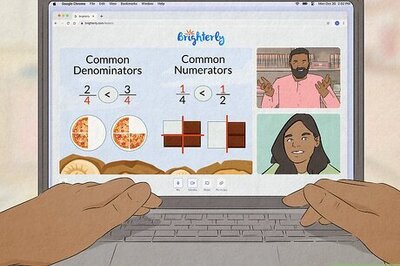
views
New Delhi: The Chief Information Commissioner of India on Wednesday has slammed the Central Bureau of Investigation (CBI) for withholding information in the Bofors Arms Deal scam.
"For how long should a citizen wait for information in a case which is pending for more than 23 years," Chief Information Commissioner Satyananda Mishra asked while hearing an RTI application by lawyer Ajay Aggarwal seeking to know the reasons for filing case withdrawal application against one of the prime accused, Italian middleman Ottavio Quattrocchi, in the Delhi High Court.
This came just a day before a petition is scheduled to be heard by the Tees Hazari court in New Delhi on Thursday from the same lawyer opposing the withdrawal of prosecution against Quattrocchi.
Agrawal had also wanted to know from the CBI about the brief given to the then Additional Solicitor General of India, B Dutta, who went to London in 2005 for de-freezing accounts of Quattrocchi and under whose orders he visited the United Kingdom. This was exposed by CNN-IBN on January 11.
The CBI has always maintained that disclosure of these details could adversely affect its prosecution and the information should be withheld as per provisions of the RTI Act.
"How can giving reasons for filing withdrawal application in the court have any bearing on the case...You yourself (CBI) have said in the court that you don't want to pursue the case. You have made your desire to drop proceedings public," CIC Mishra asked the CBI. Mishra also asked the CBI why it was withholding the details of the brief given to B Dutta.
"Not all the queries relate to prosecution. For example the visit of Dutta...What was Dutta's brief and what did Mr Dutta told the court, already being available in public, can have any effect of prosecution?" he asked. "At every stage you are saying every information is part of prosecution...If account of accused is defrozen with the consent of prosecution, does anybody need any information? In fact assumption is quite clear that prosecution itself agreed for the de-freezing of account," Mishra said.
Rajiv Sharma, a CBI official representing the agency, said the court is yet to decide on the withdrawal application and the details on the reasons sought by the applicant contain the strength and weaknesses of the case. The CBI said regarding Dutta's brief that some information was collected from Sweden, the United Kingdom and Switzerland which cannot be made public because of the confidentiality agreement signed by Indian government with these countries.
On January 6, the chief metropolitan magistrate's court in tees Hazari slammed the CBI and the way it investigated the case. It said the agency shouldn't have withdrawn the red corner alert against the suspected middleman Ottavio Quattrochi before the matter was decided. The CBI has put the cart before the horse by taking off red corner notice against Quattrocchi before the court could decide on withdrawal of prosecution, the judge had observed.
This happened four days after the indictment from the Income Tax Tribunal, establishing Ottavio Quattrocchi and Win Chaddha were given kickbacks in the Bofors Arms deal, the CBI dismissed the judgement and tried to withdraw the proceedings against Italian middleman on Tuesday morning in Delhi's Tees Hazari courts. It verdict noted that 242.62 million Swedish kroners were paid to Quattrocchi and Chadha in kickbacks. The bribes were paid into accounts of M/s Colbar Investments Limited Inc and M/s Wetelsen Overseas, controlled by Quattrocchi and his wife Maria Quattrocchi.
The kickback was paid by M/s AB Bofors as commission to Quattrocchi and Chadha through M/s AE Services and M/s Svenska.
On Thursday, the country's Additional Solicitor General PP Malhotra, who had once held the brief for Bofors accused Win Chaddha, will be defending CBI's argument.
Ironically, it was CBI's own evidence that the Income tax court had used for passing the judgement against Chaddha and Quattrocchi.
"There is lot of evidence with the CBI," said Ajay Aggarwal, Litigant against CBI.
The CBI had failed on two occasions in its attempt to get Quattrocchi extradited - first from Malaysia in 2003 and then from Argentina in 2007.
In November 2009, the agency had asked the Interpol to take Quattrocchi's name off the Red Corner notice list.














Comments
0 comment